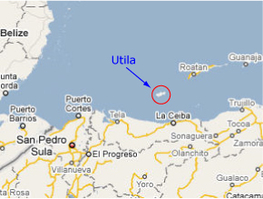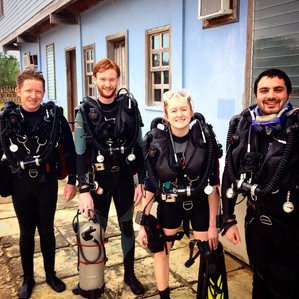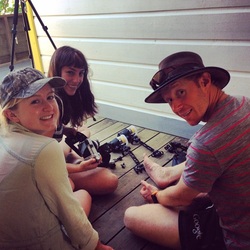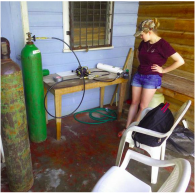REBREATHER TRAINING: BEYOND TRADITIONAL SCUBA
The past weeks I've been learning to rebreather dive with two other Oxford PhD students. The rebreathers allow us to study reefs below traditional SCUBA depth limits (up to 120m/400ft). They also scare away fewer fish than traditional SCUBA because they don't produce bubbles. The concept is that on a rebreather you're essentially breathing the same breath over and over; when you exhale CO2 is removed and oxygen added. The only caveat is that the units are more mechanically complex than normal SCUBA rigs and therefore require more training and skill.
| Resurfaced from our first rebreather dive; from left to right, our instructor Elliott Jessup, Jack Laverik (fellow PhD student), me, and Dom Adriadi-Brown (fellow PhD student). | Our team is keeping up a Facebook page. "Like" for updates. |
A LITTLE REBREATHER HISTORY
Rebreather technology has been around more than a decade, but they are only recently becoming more widely used and accepted in the scientific and recreational diving communities. Statistically, diving a rebreather is more dangerous than diving SCUBA. Accidents are all linked to user error, however, apart from a few truly freak accidents. If a diver is well trained, thoroughly inspects and maintains her unit, and follows a conservative dive plan, the rebreather diving is extremely safe and greatly benefits research. They allow us to dive to greater depths for longer periods of time and without bubbles that disturb marine life.
WHAT & WHERE

One of the research questions we are looking into is how deep reefs may (or may not be) sheltering some corals from the effects of climate change and fishing. More on that question in this PBS article.
We are training off the island of Utila, which is the site of my dive buddies' (Dom and Jack's) PhD experiments. They have a close relationship with the dive center here as they help run a program for marine biology students here on the summers. The reefs here are fairly healthy and can be reached without expensive boat trips, which is somewhat rare and helps keep research costs low. To top it off, Utila is a gorgeous Caribbean island!
We are training off the island of Utila, which is the site of my dive buddies' (Dom and Jack's) PhD experiments. They have a close relationship with the dive center here as they help run a program for marine biology students here on the summers. The reefs here are fairly healthy and can be reached without expensive boat trips, which is somewhat rare and helps keep research costs low. To top it off, Utila is a gorgeous Caribbean island!
The pictures with captions in the slide show below illustrate some of our adventures so far, including learning to use the Google Street "Ocean" View camera.





 RSS Feed
RSS Feed
